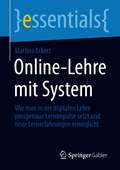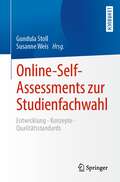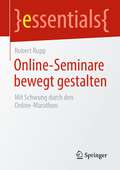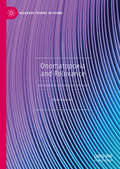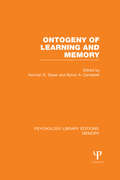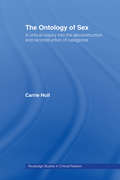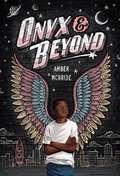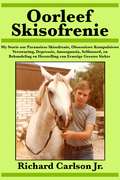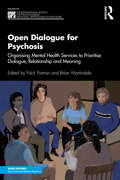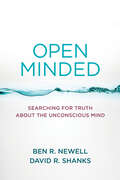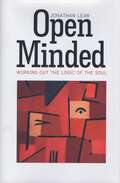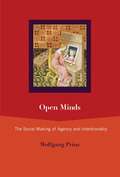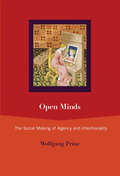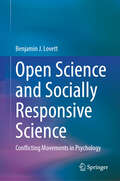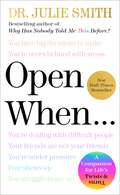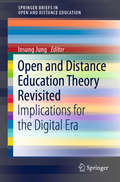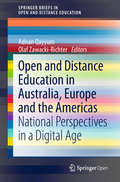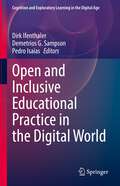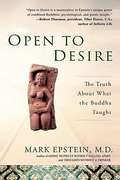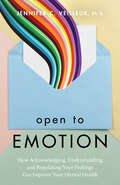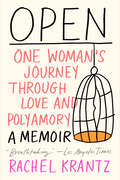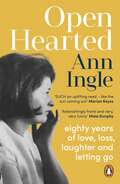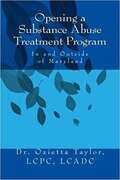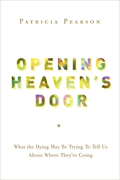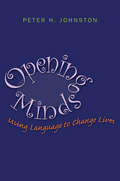- Table View
- List View
Online-Lehre mit System: Wie man in der digitalen Lehre passgenaue Lernimpulse setzt und neue Lernerfahrungen ermöglicht (essentials)
by Martina EckertDieses Buch zeigt, wie eine gelungenen Online-Lehre an Hochschulen mit dem Lernzyklus-Modell von David Kolb aufgebaut und durchgeführt werden kann. Zu Beginn der Corona-Krise 2020 mussten Lehrkräfte an Hochschulen und in der Fort- und Weiterbildung sehr schnell von der Präsenzlehre auf Online-Lehre umschwenken. Nicht nur die technischen Herausforderungen waren zu bewältigen. Durch den veränderten Zugang waren didaktische Hürden zu nehmen und Lernende auf Distanz zu motivieren, zu instruieren und Lernprozesse zu steuern. In solchen radikalen Veränderungs-Situationen ist man auf Beispiele und Modelle angewiesen. Will man sich nicht in Versuch und Irrtum verschleißen, braucht man einen Orientierungsrahmen – ein Design. David Kolb hat in den 1970er Jahren bereits seinen Lernzyklus zum Erfahrungslernen vorgelegt. Er eignet sich hervorragend um zu verstehen: welche Lernschritte vollzogen werden müssen, damit Studierende Wissen erwerben und den Lerntransfer leisten können,welche unterschiedlichen Lernbedürfnisse und Lernstile Studierende haben und wie man diese motivierend bedient,wie man Lehrmaterialien und Instruktionen am besten gestaltet, um als Lehrende/r eine möglichst nachhaltige und ganzheitliche Lernerfahrung zu initiieren,welche Entlastungen sich mittelfristig in der Lehre durch Teil-Automatisierung in digitalen Lehrformen ergeben.Mit den neuen digitalen Möglichkeiten eröffnen sich jetzt neue und spannende Perspektiven in der Lehre. Dieses Buch gibt praxiserprobte Tipps, diese Chancen zu nutzen.
Online-Self-Assessments zur Studienfachwahl: Entwicklung - Konzepte - Qualitätsstandards
by Gundula Stoll Susanne WeisDieses Buch befasst sich praxisnah mit Online Self-Assessments (OSA), die an Hochschulen zur Unterstützung der Studienfachwahl eingesetzt werden. Es beschreibt die einzelnen Schritte im Prozess der OSA-Entwicklung – von der Auftragsklärung über die Identifikation von Anforderungen, Erfolgskriterien und relevanten Personenmerkmalen, die Konzeption der einzelnen OSA-Elemente und ihre technische Umsetzung, bis hin zur Evaluation.Für jeden Entwicklungsschritt werden konzeptuelle und methodische Grundlagen vermittelt, potenzielle Stolpersteine aufgezeigt, Qualitätsstandards abgeleitet, sowie Praxisbeispiele und Checklisten bereitgestellt.Dieses Buch ist ein Gemeinschaftswerk des Netzwerks Online Self-Assessment (NOSA).
Online-Seminare bewegt gestalten: Mit Schwung durch den Online-Marathon (essentials)
by Robert RuppIn digitalen Lernformaten dominiert eine sitzende Lern- und Arbeitshaltung vor dem Bildschirm. Dies hat nicht nur schnelle Ermüdung, inneres Abschalten und Konzentrationsprobleme zur Folge - die langen Sitzzeiten führen auch zu einem Gesundheitsrisiko. Dieses essential zeigt die Gefahren des übermäßigen Sitzens. Basierend auf aktuellen Erkenntnissen der Gesundheits- und Lernforschung wird ein aktivierender Ansatz vorgestellt, der mit ganz einfachen kleinen Maßnahmen für mehr körperliche Bewegung und Sitzunterbrechungen in Online-Seminaren sorgt. Online-Seminare werden lebendiger, kurzweiliger und produktiver. Jede Mikrobewegung ist ein kleiner gesundheitsfördernder Beitrag für Lernende und Lehrende. Das essential enthält praxisanregende Empfehlungen sowie konkrete, einfach anwendbare Methoden aus der digitalen Lehrpraxis.
Onomatopoeia and Relevance: Communication of Impressions via Sound (Palgrave Studies in Sound)
by Ryoko SasamotoThis book aims to provide an account of both what and how onomatopoeia communicate by applying ideas from the relevance theoretic framework of utterance interpretation. It focuses on two main aspects of the topic: the contribution that onomatopoeia make to communication and the nature of multimodal communication. This is applied in three domains (food discourse, visual culture in Asia and translation) in the final sections of the book. It will be of interest to scholars working in the fields of pragmatics, semantics, cognitive linguistics, stylistics, philosophy of language, literature, translation, and Asian studies.
Ontogeny of Learning and Memory (Psychology Library Editions: Memory)
by Norman E. Spear Byron A. CampbellOriginally published in 1979, this volume contains chapters prepared following a conference at SUNY- Binghamton in 1977. The conference was the outcome of exciting new developments that had occurred in the ontogeny of learning and memory at the time, as well as a long-standing friendship between the editors. Many changes had taken place in the years leading up to this volume and there were now many more researchers active in the field. This volume reflected the rapidly changing state of this research area at the time and includes early contributions from researchers now well established in the field.
Ontology of Sex: A Critical Inquiry Into The Deconstruction And Reconstruction Of Categories (Routledge Studies in Critical Realism)
by Carrie HullPoststructuralism, particularly through the writings of Michel Foucault and Judith Butler, has achieved remarkable success in challenging our belief in natural sex categories and instincts. Here, Carrie Hull endorses the progressive ideals of poststructuralism while demonstrating the superiority of a realist account of sex and sexuality. Embracing biological and cultural variability, Hull nonetheless shows that the sexed body is naturally structured and deeply meaningful. Poststructuralist philosophers have argued that biological sex is a continuum rather than a binary, and that sex identity and drive are entirely performances of cultural norms rather than expressions of innate qualities. Hull draws parallels with Nelson Goodman, W.V.O. Quine, and B.F. Skinner to show that these poststructuralist theories are rooted in a nominalist, relativist, and behaviourist philosophy, and develops an alternative framework using arguments from contemporary and critical realism. Employing colourful illustrations from biology, anthropology and psychology, Hull demonstrates the rich potential of realist philosophy, and concludes that it is philosophically and scientifically correct, on one hand, and politically advisable, on the other, to maintain a distinction - albeit attenuated - between sex and gender, and sexuality and behaviour.
Onyx & Beyond
by Amber McBridePraised as "a story of perserverance and love" in a starred review by Kirkus, here is a story about keeping dreams alive.Onyx lives with his mother, who is showing signs of early-onset dementia. He doesn't want to bring attention to his home -- if Child Protective Services finds out, they'll put him into foster care.As he's trying to keep his life together, the Civil Rights Movement is accelerating. Is there anywhere that's safe for a young Black boy? Maybe, if only Onyx can fulfill his dream of becoming an astronaut and exploring space, where none of these challenges will follow him. In the meantime, Onyx can dream. And try to get his mom the help she needs.Based on her own father's story of growing up in the 1960s and facing the same challenge with his own mother, award winner Amber McBride delivers another affecting depiction of being young and Black in America.
Oorleef Skisofrenie
by Richard Carlson Jr.Richard Carlson Jr. was gediagnoseer met paranoïese skisofrenie toe hy een – en – twintig jaar oud was. Sy siekte het begin toe hy in vroeë adolessensie was. Moderne psigiatrie het Richard oor ‘n dekade misluk. Toe, na ‘n insident met die polisie het hy regtig verstaan dat sy diagnose werklik is, en het uiteindelik die lang proses om te herstel begin. Meer as tien jaar later het sy lewe geweldig verbeter. Saam met sy behandeling het Richard ook herstel van depressie, obsessiewe – kompulsiewe – versteuring, en lusteloosheid. Moenie dat dit wat met Richard gebeur het, met jou, ‘n geliefde, of ‘n pasiënt met ernstige geestes siektes gebeur nie. Wees altyd eerlik met mekaar, en met jou psigiater.
Open Dialogue for Psychosis: Organising Mental Health Services to Prioritise Dialogue, Relationship and Meaning (The International Society for Psychological and Social Approaches to Psychosis Book Series)
by Nick PutmanThis highly readable book provides a comprehensive examination of the use of Open Dialogue as a treatment for psychosis. It presents the basic principles and practice of Open Dialogue, explains the training needed to practice and explores how it is being developed internationally. Open Dialogue for Psychosis includes first-hand accounts of the process by people receiving services due to having psychotic experiences, their family members and professionals who work with them. It explains how aspects of Open Dialogue have been introduced in services around the world, its overlap with and differentiation from other psychological approaches and its potential integration with biological and pharmacological considerations. The book concludes with a substantive section on the research available and its limitations. Open Dialogue for Psychosis will be a key text for clinicians and administrators interested in this unique approach, particularly those who recognise that services need to change for the better and are seeking guidance on how this can be achieved. It will also be suitable for people who have experienced psychosis and members of their families and networks.
Open Minded: Searching for Truth about the Unconscious Mind
by Ben R. Newell David R. ShanksA provocative look at the unconscious mind that challenges contemporary perceptions and exposes the indefensible science that fostered them.How much of a role does the unconscious play in our decision making? In Open Minded: Searching for Truth about the Unconscious Mind, authors Ben R. Newell and David R. Shanks would argue: not very much. Behavioral science and public discourse have placed an outsized emphasis on the unconscious mind when it comes to understanding human behavior. Pursuing trails of fraud, intrigue, and claims about the power of unconscious thought, Newell and Shanks scrutinize the science that has contributed to our conventional wisdom and offer an important counterpoint to the ever-stronger traction that the unconscious mind has gained in public debate, such as the now ubiquitous claim that unconscious bias plays a large role in people&’s decisions and behavior.Open Minded is divided into two sections: the first examines the modern understanding of the conscious mind, and the second shifts the focus to how to reform current research. Focusing on the core processes of decision making, Newell and Shanks cut through many questionable claims about unconscious behavior. Then, they delve into the nuts-and-bolts of methodology, challenging not only psychology and the behavioral sciences but also medicine and science more broadly. In this against-the-grain approach, Newell and Shanks chart new possibilities for how we may be more open to understanding how our minds actually work.
Open Minded: Working Out the Logic of the Soul
by Jonathan LearFreud is discredited, so we don’t have to think about the darker strains of unconscious motivation anymore. We know what moves our political leaders, so we don’t have to look too closely at their thinking either. In fact, everywhere we look in contemporary culture, knowingness has taken the place of thought. This book is a spirited assault on that deadening trend, especially as it affects our deepest attempts to understand the human psyche—in philosophy and psychoanalysis. It explodes the widespread notion that we already know the problems and proper methods in these fields and so no longer need to ask crucial questions about the structure of human subjectivity.“What is psychology?” Open Minded is not so much an answer to this question as an attempt to understand what is being asked. The inquiry leads Jonathan Lear, a philosopher and psychoanalyst, back to Plato and Aristotle, to Freud and psychoanalysis, and to Wittgenstein. Lear argues that Freud and, more generally, psychoanalysis are the worthy inheritors of the Greek attempt to put our mindedness on display. There are also, he contends, deep affinities running through the works of Freud and Wittgenstein, despite their obvious differences. Both are concerned with how fantasy shapes our self-understanding; both reveal how life’s activities show more than we are able to say.The philosophical tradition has portrayed the mind as more rational than it is, even when trying to account for irrationality. Psychoanalysis shows us the mind as inherently restless, tending to disrupt its own functioning. And empirical psychology, for its part, ignores those aspects of human subjectivity that elude objective description. By triangulating between the Greeks, Freud, and Wittgenstein, Lear helps us recover a sense of what it is to be open-minded in our inquiries into the human soul.
Open Minds
by Wolfgang PrinzIn Open Minds, Wolfgang Prinz offers the novel claim that agency and intentionality are first perceived and understood in others, and that it is only through practices and discourses of social mirroring that individuals come to apply these features to themselves and to shape their architectures for volition and cognition accordingly. Developing a (social science) constructive approach within a (cognitive science) representational framework, Prinz argues that the architectures for agency (volition) and intentionality (cognition) arise from particular kinds of social interaction and communication. Rather than working as closed, individual systems, our minds operate in ways that are fundamentally open to other minds. Prinz describes mirror systems and mirror games, particular kinds of representational mechanisms and social games that provide tools for aligning closed individual minds with other minds. He maps the formation of an architecture for volition, addressing issues of agency and intention-based top-down control, then outlines the ways the same basic ideas can be applied to an architecture for cognition, helping to solve basic issues of subjectivity and intentionality. Addressing the reality and efficacy of such social artifacts as autonomy and free will, Prinz contends that our beliefs about minds are not just beliefs about their workings but powerful tools for making them work as we believe. It is through our beliefs that our minds work in a particular way that we actually make them work in that way.
Open Minds: The Social Making of Agency and Intentionality (The\mit Press Ser.)
by Wolfgang PrinzA novel proposal that the cognitive architecture for volition and cognition arises from particular kinds of social interaction and communication.In Open Minds, Wolfgang Prinz offers the novel claim that agency and intentionality are first perceived and understood in others, and that it is only through practices and discourses of social mirroring that individuals come to apply these features to themselves and to shape their architectures for volition and cognition accordingly. Developing a (social science) constructive approach within a (cognitive science) representational framework, Prinz argues that the architectures for agency (volition) and intentionality (cognition) arise from particular kinds of social interaction and communication. Rather than working as closed, individual systems, our minds operate in ways that are fundamentally open to other minds.Prinz describes mirror systems and mirror games, particular kinds of representational mechanisms and social games that provide tools for aligning closed individual minds with other minds. He maps the formation of an architecture for volition, addressing issues of agency and intention-based top-down control, then outlines the ways the same basic ideas can be applied to an architecture for cognition, helping to solve basic issues of subjectivity and intentionality.Addressing the reality and efficacy of such social artifacts as autonomy and free will, Prinz contends that our beliefs about minds are not just beliefs about their workings but powerful tools for making them work as we believe. It is through our beliefs that our minds work in a particular way that we actually make them work in that way.
Open Science and Socially Responsive Science: Conflicting Movements in Psychology
by Benjamin J. LovettThis book is the first to consider the relationships between the Open Science and DEI (social responsiveness) movements in psychology. These two movements sometimes work smoothly together, but are also sometimes in tension. They can differ in their understanding of what science is and how psychology should behave as a science. This volume aims to shed light on the trade-offs inherent in trying to search for truth while promoting social justice. It covers the history and philosophy of these two movements as background for an exploration of the tensions between them. This volume moves beyond the conflict, acknowledging the conflicts but also showing the way toward a unified field of psychology. It will appeal to researchers and students, as well as those who train them. Exploring the relationships between these two movements will be enlightening to scholars as well as practitioners.
Open When: A Companion for Life's Twists & Turns
by Dr. Julie SmithNEW YORK TIMES BESTSELLERClinical psychologist and bestselling author Dr. Julie Smith (@drjulie) returns with this highly anticipated handbook full of “break in case of emergency” advice for dealing with mental health challenges in the moment they occur.In this essential guide, Dr. Julie teaches her millions of readers and clients how to navigate life’s toughest occurrences while they’re happening, rather than moments or years after the fact. What if we can learn to harness our emotions and stay present so we can process and choose how to respond to a situation?Picking up where Why Has Nobody Told Me This Before? leaves off, Dr. Julie shares the research-backed concepts and powerful skills we can use to weather our most vulnerable moments. Learn how to move through any situation with grace, including:When it’s hard to be with yourself: facing vulnerability alone, dealing with your inner critic, and handling imposter syndrome.When it’s hard to be with other people: dealing with betrayal and knowing what to do when you (or your parents) got it wrong.When it’s hard to be with your feelings: coping with loneliness, fear, and hopelessnessWhen you’re healing from the past: getting out of a trauma response and learning how to stop ruminating about old events.When you’re looking to the future: preventing making the same mistakes, tackling uncertainty, and finding your path.Open When teaches each of us to find and listen to the positive voice within when we need it most, and to care for our future selves and our mental health.
Open and Distance Education Theory Revisited: Implications for the Digital Era (SpringerBriefs in Education)
by Insung JungThis book explores foundational theories that have been applied in open and distance education (ODE) research and refined to reflect advances in research and practice. In addition, it develops new theories emerging from recent developments in ODE. The book provides a unique and up-to-date source of information for ODE scholars and graduate students, enabling them to make sense of essential theory, research and practice in their field, and to comprehend the gaps in, and need for further enquiry into, theoretical approaches in the digital era. It also offers theory-based advice and guidelines for practitioners, helping them make and justify decisions and actions concerning the development, implementation, research and evaluation of ODE.
Open and Distance Education in Australia, Europe and the Americas: National Perspectives in a Digital Age (SpringerBriefs in Education)
by Olaf Zawacki-Richter Adnan QayyumThis book is open access under a CC BY 4.0 license.This book describes the history, structure and institutions of open and distance education in six countries: Australia, Brazil, Canada, Germany, the UK and the US. It discusses how open and distance education is evolving in a digital age to reflect the needs and circumstances of national higher education systems in these countries, and explores the similarities and differences between the ways in which they are organized and structured. It is the first book to make such comparisons and draw conclusions about the nature of open and distance education in the context of various national higher education systems. In a digital era with growing use of online education as well as open and distance education, this book is particularly useful for policy-makers and senior administrators who want to learn about organizing and expanding open and distance education provision. It is also a valuable reference for researchers, academics and students interested in understanding the different approaches to open and distance education.
Open and Inclusive Educational Practice in the Digital World (Cognition and Exploratory Learning in the Digital Age)
by Dirk Ifenthaler Demetrios G. Sampson Pedro IsaíasThis book is about inclusivity and open education in the digital age. It reports the latest data on this topic from the 2021 Cognition and Exploratory Learning in the Digital Age (CELDA) conference. This annual conference focuses on challenges pertaining to the evolution of the learning process, the role of pedagogical approaches and the progress of technological innovation, in the context of the digital age. The material in this book represents the work of both researchers and practitioners in an effort to cover both technological and pedagogical issues in ground-breaking studies. The book covers a wide array of topics examining the deployment of learning technologies, proposing pedagogical approaches and practices to address digital transformation, presenting case studies of specific technologies and contexts and overall debating the contribution of learning technologies for the improvement of the learning process and the experience of students and for the development of key competences. It represents the best work reported during CELDA 2021, comprising expanded peer reviewed chapters from best papers focusing on open education models, inclusive learning environments and adaptive as well as personalized learning support.
Open to Desire: The Truth about What the Buddha Taught
by Mark Epstein“A masterpiece. . . . It teaches us how not to fear and repress, but to rechannel and harness the most powerful energies of life toward freedom and bliss. ” —ROBERT THURMAN It is common in both Buddhism and Freudian psychoanalysis to treat desire as if it is the root of all suffering and problems, but psychiatrist Mark Epstein believes this to be a grave misunderstanding. In his controversial defense of desire, he makes clear that it is the key to deepening intimacy with ourselves, each other, and our world. Proposing that spiritual attainment does not have to be detached from intimacy or eroticism, Open to Desire begins with an exploration of the state of dissatisfaction that causes us to cling to irrational habits. Dr. Epstein helps readers overcome their own fears of desire so that they can more readily bridge the gap between self and other, cope with feelings of incompletion, and get past the perception of others as objects. Freed from clinging and shame, desire’s spiritual potential can then be opened up. .
Open to Emotion: How Acknowledging, Understanding, and Regulating Your Feelings Can Improve Your Mental Health
by Jennifer C. VeilleuxA practical, engaging resource that offers a clearer understanding of the science of emotion and a helpful path forward in regulating your emotions. Rates of anxiety and depression are high and continue to rise. Substance use and associated overdose deaths constitute a public health emergency, and many people suffer consequences from exposure to traumatic events. All these are, at their root, problems with emotions. People can get help navigating their emotions via therapy, but stigma toward mental illness and reticence to seek therapy continues to make it difficult for people to get the help they need. An understanding of how emotions work and empirically supported strategies for flexibly regulating emotions is relevant to virtually all of the problems that bring people to psychotherapy, including relationship problems discussed in couples and family therapy. A broad understanding of emotional functioning also has the benefit of helping people cultivate more compassion for those who might experience emotions differently than they do. This reader-friendly book illustrates that emotions are messages; they provide information, like an email, a physical postcard, a letter from a pen-pal, or even a medical bill. Information isn&’t inherently good or bad, and narrowly aiming to minimize unpleasant emotions and maximize pleasant ones ignores the research-based fact that the unpleasant emotions can have value too. This book teaches you about the science of emotion and the best research-based practices for coping and regulating emotion. It shows you how this understanding can then be applied toward solving a variety of problems, including self-realization and self-compassion, as well loving others in a deeper way. This is an essential guide for anyone seeking to improve their overall emotional health.
Open: An Uncensored Memoir of Love, Liberation, and Non-Monogamy
by Rachel KrantzAn award-winning journalist chronicles her first open relationship with &“breathtaking honesty&” (Los Angeles Times) in this &“sexy, messy, necessary look at polyamory&” (The Advocate).FINALIST FOR THE LAMBDA LITERARY AWARD • ONE OF THE BEST BOOKS OF THE YEAR: PopSugar, Them When Rachel Krantz met and fell for Adam, he told her that he was looking for a committed partnership—just one that did not include monogamy. Intrigued and more than a little nervous, Krantz decided to see whether their love could coexist with the freedom to date other people. Could they strike an exquisite balance between intimacy and independence, and find a way to feel passion for each other once the honeymoon phase ended? Krantz documents her dive into polyamory, from Brooklyn sex parties to swinging and beyond, in her extraordinary debut memoir. As she attempts to write a new plot for her love story with Adam, she runs up against miscommunications, gaslighting, and ancient power dynamics, and seeks solid ground in a relationship where the rules are ever-shifting. An award-winning journalist, she interviewed scientists, psychologists, and people living and loving outside the mainstream as she searched to understand what polyamory would do to her heart, her mind, and her life. With an unflinching eye and page-turning storytelling, Open is groundbreaking in both its documentarian approach to polyamory and its explicit subject matter. From debilitating anxiety spirals to heart-opening connections with the men and women she dates, Rachel puts her whole self on the line as she attempts to redefine what a relationship is—or could be.
Openhearted: Eighty Years of Love, Loss, Laughter and Letting Go
by Ann IngleSHORTLISTED FOR TWO IRISH BOOK AWARDS'Something they don't tell you about getting older is that you fall. Oh, you hear about it in passing, of course, "She had a fall, poor thing". Falling is not something you ever think about as a younger woman. You think about falling in love . . .'At 20 Londoner Ann Ingle fell madly in love with an Irish fellow she met on holiday in Cornwall. At the church to arrange their shotgun wedding she discovered that he hadn't even told her his real name.Sixty-odd years later Ann looks back on that first glorious fall and in a series of essays considers what she has learned from the life that followed - bringing eight children into the world, their father's years of mental illness and tragic death at 40, being a cash-strapped single mother in 1980s Dublin, coming into her own in her middle years - going to college, working and writing, and continuing to evolve and learn into her ninth decade, even as she accepts the realities of being 'old'.Candid about everything that matters - love, sex, heartbreak, money, class, religion, mental health, rearing children (and letting them go), reading and writing, ageing - Open-Hearted is a compelling story about living life in a spirit of curiosity and delight and with a willingness to look for good in others._________________________________'By some distance the most courageous, most poignant, most life-affirming memoir I've read in the last twenty years and more' Paul Howard'Genuinely inspirational. I LOVE ANN INGLE' Marian Keyes'What a beautiful openhearted, at times broken-hearted memoir ... honest, funny, searingly direct, a wonderful voice ... remarkable' Joe Duffy'Really beautiful. Searingly honest, astonishingly frank and very, very funny' Maia Dunphy
Opening A Substance Abuse Treatment Program: In And Outside Of Maryland
by Ozietta TaylorThis book is pertinent to establishing a substance abuse treatment program. It is a template that can be modified to develop DWI education, outpatient and intensive outpatient programs in the State of Maryland; but can be further modified to establish treatment programs in any State in the United States.
Opening Heaven's Door
by Patricia PearsonFrom the award-winning, groundbreaking author of A Brief History of Anxiety...Yours and Mine comes a touching, exhilarating, challenging exploration of the inexplicable gleamings of another world many of us experience, in life, in grief, and near death. Sparked by extraordinary experiences that occurred in her family when her father and her sister both died in 2008, Patricia Pearson was launched on a journey of investigation into what she calls "a curious sort of modern underground--a world beneath the secular world, inhabited by ordinary human beings having extraordinary experiences that they aren't, on the whole, willing to disclose." Roughly half the bereaved population, about 20% of those near death who recover, and an unreported number of the dying witness or experience a sensed presence, the mystery of near-death awareness, and, if they are not in horrible pain or medicated into unconsciousness, rationally inexplicable feelings of transcendence and grace as they depart on the journey from which none of us return. Pearson brings us effortlessly into her illuminating quest for answers, inspiring us to own up to experiences we may never have shared with anyone. Secular or religious, all of us wonder deeply about these things if we let ourselves, and also about the medical, social and psychological implications of understanding what it means to pass through heaven's door.
Opening Minds: Using Language to Change Lives
by Peter JohnstonIntroducing a spelling test to a student by saying, 'Let' s see how many words you know,' is different from saying, 'Let's see how many words you know already.' It is only one word, but the already suggests that any words the child knows are ahead of expectation and, most important, that there is nothing permanent about what is known and not known. Peter Johnston Grounded in research, Opening Minds: Using Language to Change Livesshows how words can shape students' learning, their sense of self, and their social, emotional and moral development. Make no mistake: words have the power to open minds – or close them. Following up his groundbreaking book, Choice Words, author Peter Johnston continues to demonstrate how the things teachers say (and don't say) have surprising consequences for the literate lives of students. In this new book, Johnston shows how the words teachers choose can affect the worlds students inhabit in the classroom. He explains how to engage children with more productive talk and how to create classrooms that support students' intellectual development, as well as their development as human beings.
